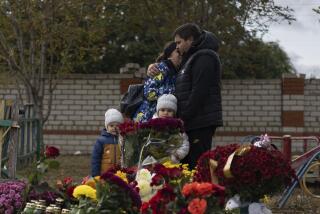U.N. Appeals to Kosovo’s Albanians to Stop Violence
- Share via
PRISTINA, Yugoslavia — Unable to stop attacks by ethnic Albanians against Serbs, the United Nations and NATO appealed Wednesday to Kosovo’s Albanian majority to cooperate with international peacekeepers trying to restore order.
In the latest incident, three Kosovo Serbs were injured Tuesday night when a grenade exploded in Gnjilane, the largest town in the southeastern region where American troops are supposed to keep order. The three suffered minor injuries.
The blast occurred one day after two young Serbs--a man and a woman--were killed and five others injured in a mortar attack on the village of Klokot in the U.S. sector.
Reprisal attacks have prompted most of the 200,000-member Kosovo Serbian community to flee the province since North Atlantic Treaty Organization and Russian peacekeepers came June 12 to enforce the peace accord that ended the 78-day Western bombing of Yugoslavia.
In a joint statement, U.N. mission chief Bernard Kouchner and peacekeeper commander Lt. Gen. Mike Jackson of Britain condemned “the illegal and threatening activities which have been taking place.”
“We will, however, only succeed in generating a secure environment with the full cooperation of the local population,” they said. More than 90% of Kosovo’s estimated prewar population of 2.1 million people are ethnic Albanians.
In Belgrade, the Yugoslav government demanded “urgent measures” to guarantee security for Serbs in the province, the official Tanjug news agency reported.
The Belgrade government, in a note to Jackson and Kouchner, complained that, despite the presence of 40,000 international peacekeepers, “the Serb and non-Albanian population of Kosovo is constantly exposed to the terror of the Kosovo Liberation Army.”
KLA leaders have condemned the attacks and blame them on criminal elements.
In a television interview Tuesday, Serbia’s ultranationalist deputy premier, Vojislav Seselj, asserted that Kosovo Serbs are at greatest risk in the American sector, where most of them are congregated.
Nevertheless, Seselj urged Serbs to remain there to defend Belgrade’s sovereignty over the province.
More to Read
Sign up for Essential California
The most important California stories and recommendations in your inbox every morning.
You may occasionally receive promotional content from the Los Angeles Times.










